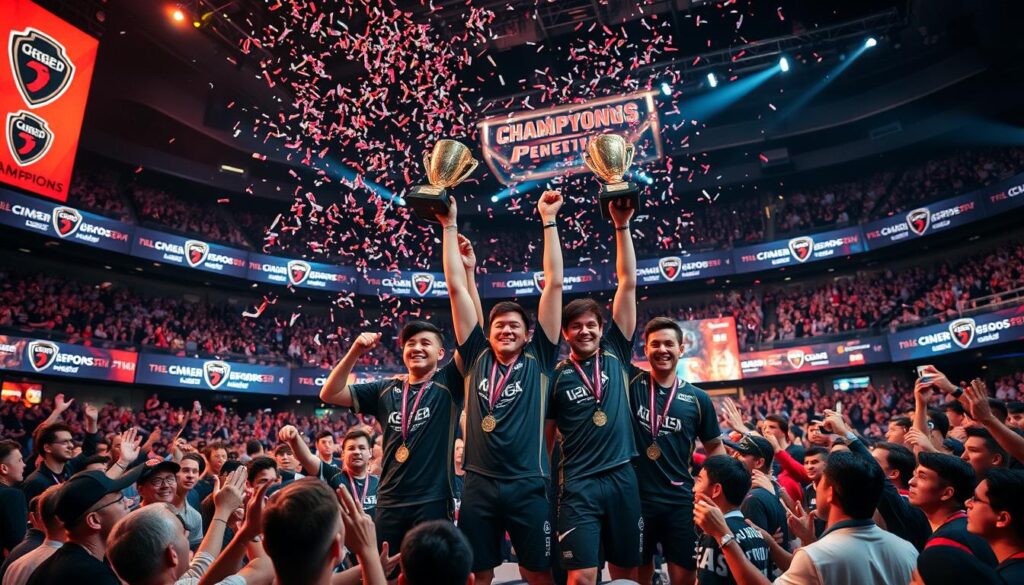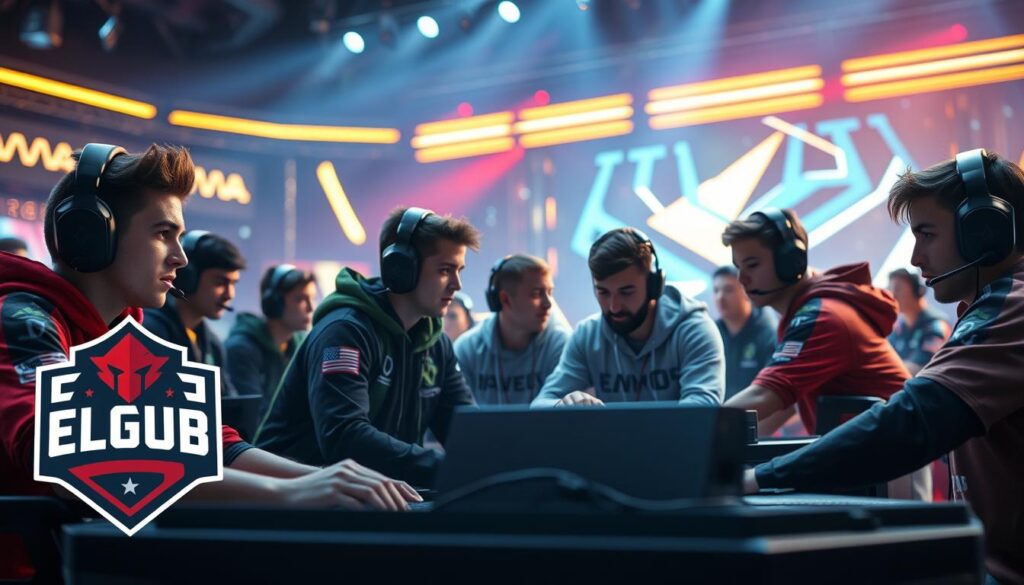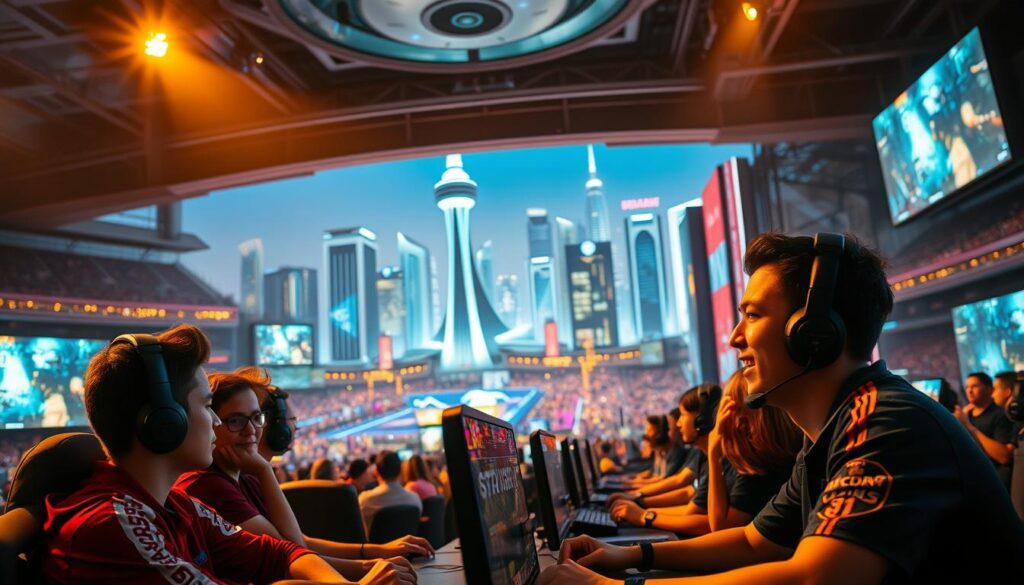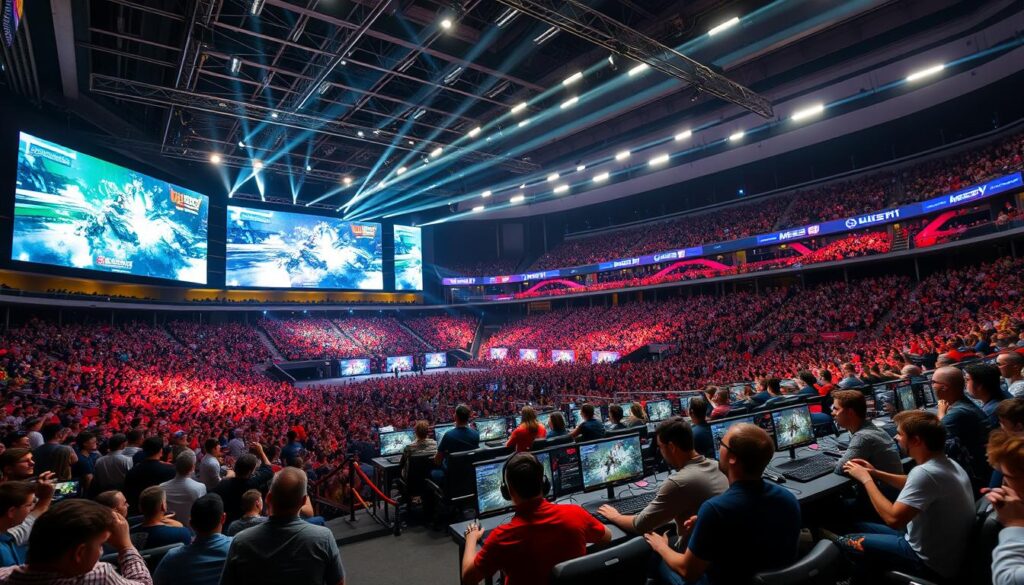Welcome to the digital arena where today’s warriors use mice instead of swords. This is not for casual gamers. It’s where teams like Team Liquid’s Valorant roster and Evil Geniuses’ Dota dynasty make millions from virtual battles. Why do some teams become legends while others fade away quickly? Let’s find out.
This is your backstage pass to the world of esports. It shows what makes some teams last forever while others disappear fast. It’s not just about winning or being popular on Twitter. The real magic is when strategy meets teamwork, making them stars in gaming and sponsorships.
We’ll look at everything from intense training to smart business moves. Wonder how some teams stay on top for years? (Like Fnatic.) Or why some new teams rise fast but then fall hard?
Stay with us as we explore tournament strategies, legendary rivalries, and why your favorite team often fails in the big games. The stage is set. Let’s see who’s truly a champion.
Introduction: The Power of Teams
Imagine a world where strategy meetings are streamed more than sitcoms. Jersey sales rival pop stars’ merch drops. Welcome to the pro esports teams ecosystem. These aren’t just gamers; they’re cultural powerhouses.
Take 100 Thieves, for example. They didn’t just build a League of Legends roster. They engineered a lifestyle brand. Limited-edition hoodies sell out faster than Taylor Swift tickets.
What makes these squads tick? Picture a Black Mirror episode directed by Vince McMahon. T1’s League of Legends division runs drills with military precision. They churn out TikTok content by night.
Their training facility is a mix of a Seoul tech incubator and American Idol auditions. Players aren’t just athletes. They’re content creators, brand ambassadors, and meme templates.
“Building a championship team isn’t about finding five great players—it’s about creating five symbiotic neurons in one competitive brain.”
The real magic happens in the pro esports teams business model. Merchandise revenue funds analytics departments bigger than some Wall Street firms. Teams like Cloud9 employ psychologists and nutritionists.
It’s Moneyball meets Ready Player One, with Twitter drama as the bonus round.
Why does this matter? Because these organizations aren’t just playing games. They’re rewriting the rules of entertainment. When FaZe Clan’s stock fluctuates, it’s not just investors watching. It’s Gen Z’s version of the Dow Jones.
The line between esports and mainstream culture isn’t blurring anymore. It’s been headshot into oblivion.
Hallmarks of Elite Teams
Winning in esports isn’t just luck. It’s about planning victory like a SpaceX launch. What makes champions stand out? It’s a mix of data, biometrics, and management that shakes Wall Street.

G2 Esports doesn’t just pick players—they look for psychological ninjas. Their talent team uses deep personality tests, like the CIA’s. A former analyst said, “We don’t look at KD ratios. We see how fast they bounce back from rage.”
Team Secret’s scouting is like Moneyball meets The Social Network. They track:
- Micro-reaction times (faster than a TikTok trend cycle)
- In-game decision trees (more complex than IKEA instructions)
- Team synergy scores (calculated like dating app compatibility percentages)
| Organization | Secret Weapon | ROI |
|---|---|---|
| G2 Esports | Neuroscience coaches | 3 championship wins (2022-2023) |
| Team Secret | AI scouting models | 47% win rate improvement |
| Fnatic | Chef-designed brain food menus | 15% faster reaction times |
Nutrition plans are like Michelin-starred labs for top orgs. Fnatic’s players eat “cognitive enhancement bites” that look like Elon Musk’s Neuralink. They sleep in pods that feel like NASA’s zero-gravity training.
This isn’t just gaming. It’s human performance engineering in disguise. The next step? Cloud9 is testing VR trauma drills to prepare for championship pressure. They think losing in a virtual game should prepare you for real esports challenges.
Rosters & Legendary Players
Is Michael Jordan’s scoring better than LeBron’s playmaking? Pro esports teams debate this every day. They wonder if they should focus on star players or improve everyone. Let’s look at gaming’s biggest names to find out.
Faker’s $10 million T1 contract is more than just stats. It shows League of Legends’ “Unkillable Demon King” is a legend. His 70% win rate is unmatched, making MJ’s six championships seem normal.
Bugha, the Fortnite star, turned one big win into a fortune. He says winning is like chess, always thinking three steps ahead. Valorant’s TenZ, known for his unique mouse grip, has sparked many debates online.
“Great teams are like orchestras, not solo acts. Dev1ce’s AWP shots are like eighth notes. Our team’s strategy is the rhythm.”
| Player Type | Strengths | Weaknesses | Modern Example |
|---|---|---|---|
| Solo Carry | Clutch moments, fame | Depends on the meta | TenZ (Sentinels) |
| System Player | Adapts well, lasts long | Less flashy | Xyp9x (Astralis) |
Recent roster changes show a shift. Teams now value players who help the team more than just their skills. Cloud9’s CS:GO team, for example, focused on team roles over individual skill.
Is the solo superstar era over? Not quite. But teams are now looking for a mix of both. It’s like the Warriors, where everyone works together but stars get to shine too.
Fiercest Rivalries in Esports
Forget Marvel vs. DC – esports rivalries are a whole new level of competition. They’re not just games; they’re high-stakes battles played out in pixels. Let’s look at three rivalries that have made esports organizations household names.
The Seoul-Beijing Cold War (League of Legends): When T1 meets Royal Never Give Up, it’s more than a game. It’s a clash of South Korea’s strategic play against China’s bold moves. The 2022 MSI finals drew 2.1 million viewers, showing how esports can unite nations.
G2 vs Fnatic: Europe’s Civil War: This rivalry is like a digital version of Brexit. G2’s fun-loving style faces off against Fnatic’s serious approach. Their 2019 LEC Spring Finals introduced the “Caps Transfer” saga, a $6 million move that shocked fans.
CoD’s American Bloodsport: OpTic Chicago vs Atlanta FaZe is like a digital gang war. Their 2021 CDL Championship match drew 1.4 million viewers, despite starting at 3 AM EST. It’s all about the intense rivalry and the desire to win.
| Rivalry | Game | Peak Viewership | Cultural Impact |
|---|---|---|---|
| T1 vs RNG | League of Legends | 2.1M | Asia-Pacific tech rivalry proxy |
| G2 vs Fnatic | League of Legends | 1.8M | EU server loyalty splits |
| OpTic vs FaZe | Call of Duty | 1.4M | US streaming culture catalyst |
Healthy rivalries can increase viewership by 40% (Esports Observer, 2023). But, there’s a dark side. When Team Liquid’s Jensen called Cloud9 “Walmart champions” in 2022, it led to death threats. The line between excitement and harassment is very thin.
These rivalries are more than just entertainment; they’re big business. Sponsors pay 25% more for matches with rivalries (Forbes Esports). But, when SK Telecom T1’s Faker talked about “rivalry fatigue,” it showed the human side of esports. The question is, do we watch for the game or the thrill of victory?
Team Success Stories
Every championship has a story that’s almost too good for movies. Let’s look at three best gaming teams who turned challenges into triumphs. They didn’t use magic; just hard work and smart strategies.

OG’s 2019 International run showed that even underdogs can win big. They changed their team just before the tournament and won $15 million. Their secret? Improvisation in Dota 2, like jazz.
“We didn’t counter strategies. We countered mindsets.”
Sentinels took over Valorant by using psychology. They watched their opponents closely, turning eco rounds into mental battles. Their strategy was simple yet effective.
- Daily 2-hour VOD reviews of their own losses
- Role fluidity drills (even IGLs played duelists)
- Post-match “ego checks” to prevent complacency
The Shanghai Dragons had a huge turnaround after starting 0-40 in Overwatch League. They used sports psychologists, customized hero pools, and a “failure lab” to analyze losses. Two years later, they won every game.
Two years later, they were unbeaten. Their coach said, “We stopped chasing perfection. Started engineering it.”
These teams didn’t just win by chance. They dominated through:
- Turning weaknesses into strengths
- Adapting in a systematic way
- Keeping morale high
When you see a team win, remember the years of hard work behind it. The real question is, what new rules will they break next?
How Teams Are Built and Managed
Creating a top pro esports team is more than just picking stars. It’s a mix of advanced analytics and careful team building. Cloud9, for example, uses special tools to track player performance like stock prices. They have a system to find and grow new talent, much like MLB’s farm system.
Team Liquid focuses on mental health, using sports psychologists to help their players. They believe in preparing players for the mental challenges of competition. Their director says they’re not just training gamers, but creating warriors.
“Managing these rosters? Imagine herding cats. On Adderall. Wearing VR headsets.”
MAD Lions in Europe found their star jungler in an internet cafe. He was dominating games from his grandmother’s basement in Warsaw. Their approach is all about finding hidden gems.
Today’s team building includes:
- AI tools that watch 10,000 hours of Twitch streams every week
- Neuroscience labs that help players sleep better for tournaments
- Experts who solve conflicts and manage team drama
The real magic is in creating the right team chemistry. Teams use special algorithms to match players’ personalities. This way, they build a team that works together like a well-oiled machine.
Here are some stats from last year’s top teams:
| Team | Avg. Scouting Cost | Mental Health Budget | Roster Changes |
|---|---|---|---|
| Cloud9 | $2.1M | $450K | 1 |
| MAD Lions | $780K | $310K | 3 |
| Team Liquid | $3.4M | $890K | 0 |
The world of pro esports teams has changed a lot. Today, they operate like big companies but with better snacks. They’re using new ideas to win games and changing the sport.
Tips for Joining Top Teams
Want to move from solo play to a pro contract? Treat your career like a viral TikTok. To get into top Esports organizations, you need talent, branding, and strategy. It’s like playing the Hunger Games and networking at the same time.
Step 1: Make your Twitch channel a highlight reel. Share your best 3-minute plays, not long boring ones. Scouts want to see if you fit their team’s image, not just your skills.
Step 2: Network like you’re at Comic-Con speed-dating. Tournaments are great for meeting people, not just playing. Remember, flattery can go a long way before asking for a tryout. Don’t show desperation.
The Specialist’s Edge
Top teams don’t want just another player. They look for those who can:
- Lead like a traffic controller on Red Bull
- Play off-role champions better than TikTok trends
- Trash-talk opponents with Shakespearean insults
“Teams hire personalities, not just kill/death ratios. Be the player they’d want to hang out with.”
| Player Archetype | Key Strategy | Risk Factor |
|---|---|---|
| Streamer Personality | Brand deals & meme appeal | Skill plateau |
| Tournament Grinder | Consistent top placements | Burnout risk |
| Analytical Wildcard | Meta-breaking strategies | ”Too innovative” stigma |
Not sure what to do? Check out our guide on contracts, salaries, and avoiding being a Twitch clip. In Esports organizations, you’re either valuable or just content. Choose your path carefully.
The Future of Team Play
Tomorrow’s pro esports teams will be way ahead of today’s champions. Imagine AI coaches analyzing players’ expressions during key moments. They’ll also have blockchain smart contracts for bonuses and superstar rosters playing in three different games in one week. The Saudi government’s $38 billion investment is more than just buying stadiums. It’s creating a new world for competitive gaming.
Three big changes will change how teams work together:
- Cross-game mercenaries: Why keep a star player in just one game when they can play others too?
- VR bootcamps: Teams will train in super-realistic simulations, making games like Call of Duty seem simple.
- Digital real estate wars: Orgs will buy virtual territories in metaverse battlegrounds, not just sign players.
Blockchain player contracts will be a game-changer. Imagine DAOs voting on team changes and NFTs tracking players’ careers. When Team Liquid can have a Dota 2 and a Fortnite team, traditional sports will seem old-fashioned.
| Current Practice | 2025 Innovation | 2030 Revolution |
|---|---|---|
| Year-long contracts | Blockchain performance clauses | AI-negotiated micro-deals |
| Local training facilities | VR cross-team scrims | Holographic global arenas |
| Single-game specialization | Dual-title players | Meta-game strategists |
The line between player and platform will soon disappear. Major orgs might own the digital battlegrounds where games are played. It’s not just about winning anymore; it’s about controlling the whole system.
As VR gear gets cheaper, expect to see more global teams. A teenager in Nebraska could practice with Seoul teammates in super-realistic simulations. The future of pro esports teams is about more than just better players. It’s about changing the rules of competition.
Conclusion
The best gaming teams don’t just win games; they change the game. Think of Team Liquid’s smart map control in League of Legends or G2 Esports’ funny trash talk. They play like chess masters, mixing skill with showmanship.
Elite teams are more than just their kill counts. Evil Geniuses’ Dota 2 drafts are like musical compositions. FaZe Clan turns Counter-Strike’s rounds into high-stakes poker. The game changes fast, but the best teams adapt before anyone else.
Sun Tzu’s Art of War is key for today’s gamers. Study your opponents like Tarantino studies film. Watch how T1’s Faker controls the game like a conductor. Sentinels’ Valorant plays are like Navy SEAL missions.
When you talk about The International’s prizes or debate who’s the best, remember this. The top teams are not just players; they’re scientists. They mix psychology, economics, and quick reflexes. So, grab your controller, follow your favorite teams, and enjoy every clutch play. Just don’t forget to drink water – even esports fans need to stay hydrated.




